Welcome to Alligator New York City — where the music is bumpin’ and the animation is hand-drawn! But you’re not here for lively audiovisuals, you’re answering the call of your new friend Pat the Alligator to figure out who is (probably) trying to kill him. Armed with a watch and a notepad in this point-and-click mystery extravaganza, you explore Alligator NYC and question different members of Pat’s family to figure out what their “birthday surprise” is by the end of the night.
This game isn’t all alligator-based puns and funky music (though there are a lot of both) — the clever game design, multiple endings, and the sometimes spooky corners of Alligator New York City all deserve a closer look. Let’s dive into it!
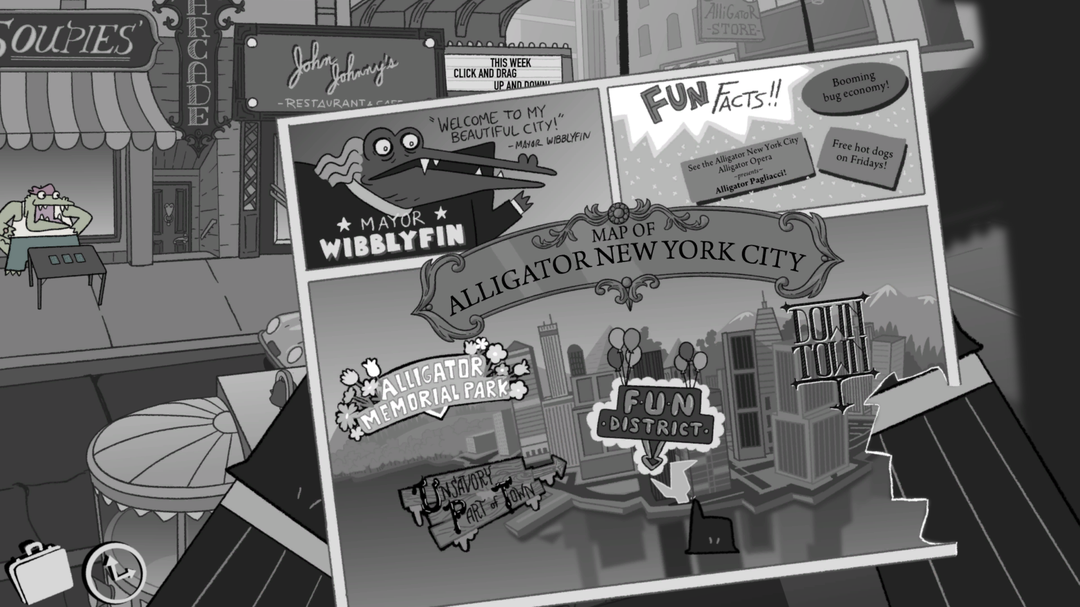
Personally, I want to see Alligator Times Square.
Making Sense Of A Reptilian World
Later Alligator is, at its heart, a point-and-click mystery that houses 30 mini-games and challenges associated with each member of Pat’s family and the citizens of Alligator NYC. You start as a faceless, besuited alligator and meet the anxious Pat as he’s celebrating his birthday at a hotel restaurant. Convinced that his family’s “event” that night is a plot to murder him, he tasks you with speaking to his relatives to figure out their plans before time runs out.
The mechanics are simple, and all you need is a mouse to both navigate the world and play all the mini-games. Only one time you’ll be required to access an internet browser, and optionally use a QR code scanner, but both are small (and fun) parts of the game compared to the majority where you click through with your gloved and scaly hand.
There are only three buttons to interact with on your UI with the first being a briefcase that serves as your settings menu, and the other two being the main ways to navigate the game: a watch and a map. Checking your watch reveals that traveling between areas and playing a character’s mini-game will both take 15 minutes. Pat tells you that he will contact you again at certain times, meaning you have limited time before the game forces you back to Pat’s hotel for a check-in.
Once you leave Pat, you’re given free reign to click around the bustling streets of Alligator NYC, with areas like the Fun District, Alligator Memorial Park, and the Unsavory Part of Town to find collectables and talk with various characters. Initially interacting with a character will bring up a notepad with three basic queries:
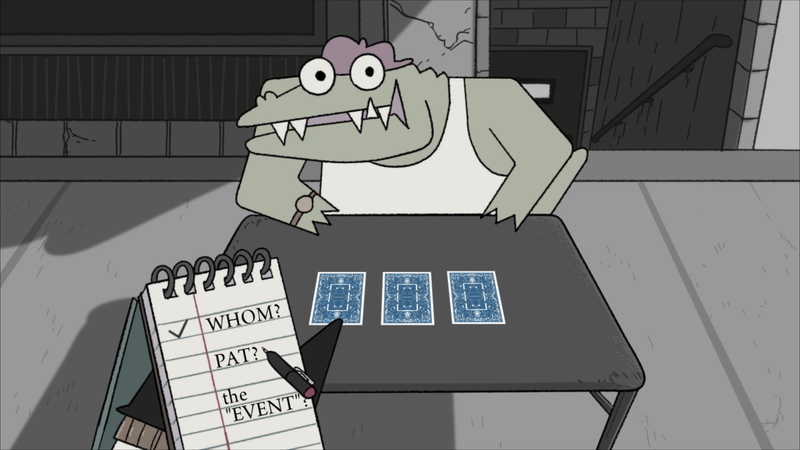
Talking to a character like Slick Mickey about who he is, how he knows Pat, and whether he knows about the event, won’t cost you any time. But inevitably Slick Mickey -- and every other character -- will prompt you to play a mini-game for more answers that will take up to 15 minutes of your time… if you get it on the first try. Fail the first time and you have to play it again, eating up another fifteen minutes.
Once you succeed at the mini-game or challenge, the character gives you information about the surprise event for Pat to varying degrees of usefulness. You report back to Pat at set times throughout the day, until 6:30, when you finally get to attend the event and the game ends.
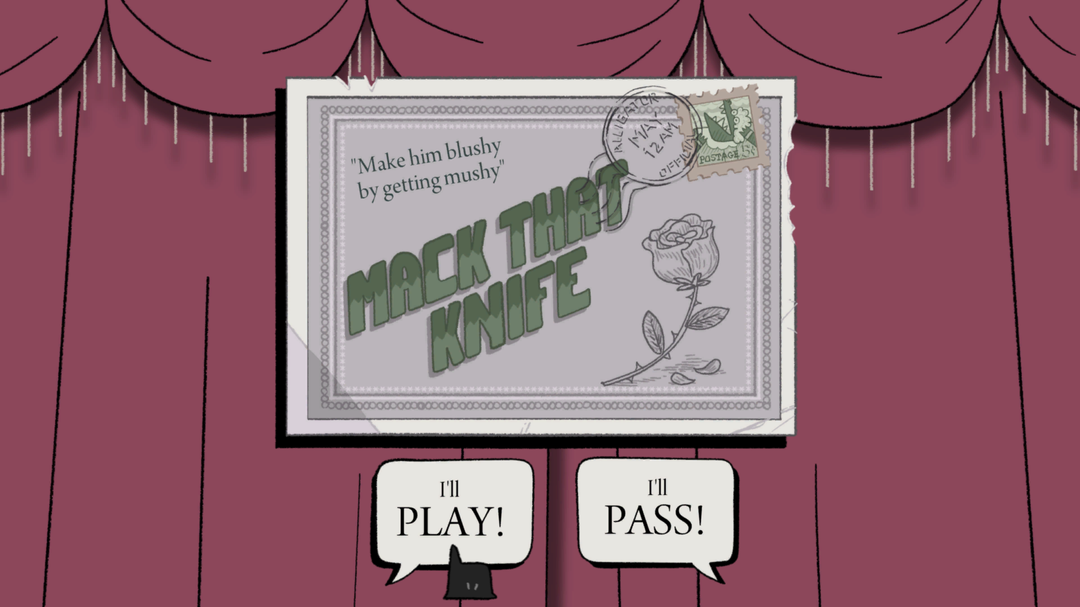
Where else can you go on a date with alligator Goro Majima?
The mini-games have real variety, with something standing out for everyone. Since you don’t have to play every single one to complete the game, you can find the ones you like or are good at, and go from there. They range from familiar ones -- like pinball, claw machines, “spot the difference” puzzles, and simple card games -- to some unexpected ones, like a Flappy Bird clone, an Ouija board, and an actual full on otome dating simulator, complete with art and music changes to suit the genre.
This doesn’t even give due credit to the fantastic, punny names each game has. Names like “Flowers of Annoy” for a Towers of Hanoi game, “Manic Pixie Dream Grill” for a grill management game, and something like “Watch a Totally Normal Baby” for a game where you ward off ghosts trying to possess a baby.
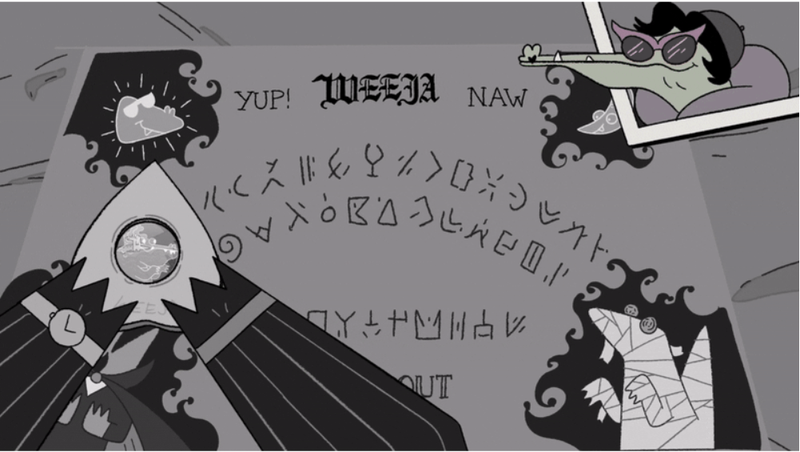
Oh, I’m sorry. Did I forget to mention that ghosts are real in this universe?
Mysteries Abound
The world and narrative of Later Alligator is silly, irreverent, and cohesive. Its entire premise is goofy but it commits, gladly accepting the madness of ghosts and extended families of alligators and just keeps going, making it even funnier. The game hits a sweet spot for my sense of humor: fourth wall breaking enough to be fresh and funny without being forced, understanding that it is a game that also has a unique story to tell.
Pat telling you to check your watch “...in case you get distracted doing a collection of menial tasks formatted in an enjoyable manner” is contrasted with a story where you learn the impact Pat has on his friends and family. If you play into the world of Later Alligator, it welcomes you with open arms. Ghosts haunt phones? Sure! An anxious guy who is excessively paranoid meaningfully touches the lives of those around him? That, too.
The lighthearted tone of the game makes the mysterious and spookier parts that much more nefarious. The fact that Nana Rue owns an extremely haunted antique store and distributes her malevolently possessed items is way more unsettling because no one takes it seriously. Ghosts trying to possess a baby, or a dresser filled with blood and the actual literal void are joked off or not even acknowledged, and it filled me with a sense of unease that makes me think Pat wasn’t sounding too paranoid after all.
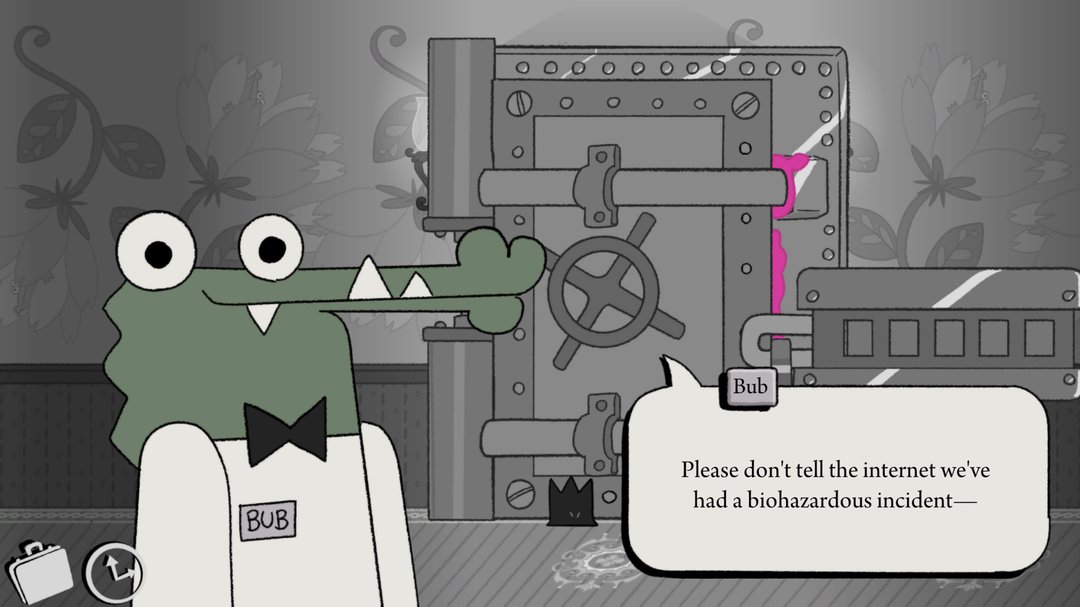
The worst (best?) part is that the game makes it clear it will not explain away the dark corners of Alligator NYC, and that’s really the kind of ride this game gives you. Suspend your disbelief, accept it, and move on, or you’ll be stuck on the ”why” when you could be having fun with all the mini-games.
Speaking of, there's an even better example of how scary the game can be in contrast to its cartoony antics, but at risk of spoiling it I'll just say you should play the game a couple times over.
Play That Song Again
That’s right, multiple playthroughs -- Later Alligator is a fun romp of a mystery on the first run, but the real depth comes in during the second and third. If the trailer and the game’s store page didn’t advertise the “multiple endings” aspect enough, a bard named Mandy plays the role of a Greek chorus by insisting you replay.
The game design itself pushes you to multiple attempts, and that’s what I want to shine a spotlight on. I didn’t even know the game had multiple endings when I first started it, or that you should play it multiple times. I kind of just felt it midway through my first playthrough every time I checked my watch and saw the minutes ticking down.
Throughout the game and its use of a limited time mechanic, it becomes increasingly clear that you cannot talk to every character and play every single mini-game within one playthrough. If you don’t have a completionist mindset that drives you to try everything (like me), then several systems push you to want to do more. After every successful mini-game, you get a portrait of the family member that you use to piece together a family tree. Another has puzzle pieces that you can uncover by visiting different areas and clicking everything, talking to different people, completing puzzles in different ways, etc.. Again, it becomes clear that by the end of your first playthrough, you won’t be able to get them all, and there’s still more to uncover.
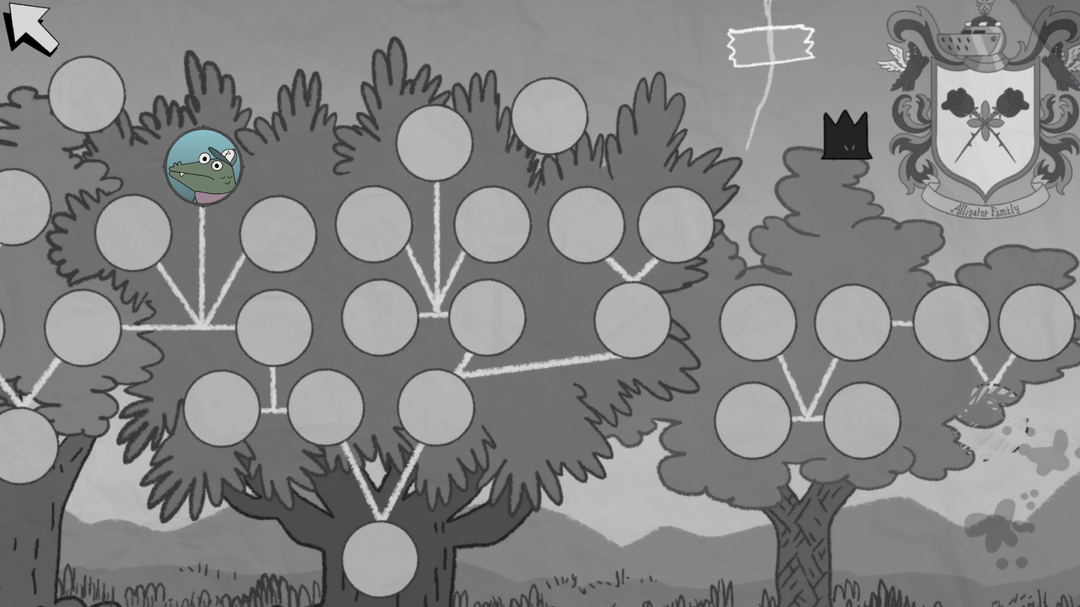
That ‘more’ isn’t just gameplay or collectibles: it’s also the narrative. With each conversation with one of Pat’s relatives, it becomes increasingly clear that the “event” at the end of the night is most likely a surprise party. But enough questions remain to keep you going. I found myself saying, "So if it’s obviously just a birthday party, then why…" and then once you've figured that out, there always seems to be another mystery.
Then why is the player character there, and who are we? Why is Pat so terribly convinced someone is trying to murder him? Why does a character also concerned about his family’s murderous tendencies have corrosive pink goo in his hotel room? Why is there a missing piece of the map, and a scratched-out member on the family tree? If there isn't something nefarious, then why did the lights go out in the hotel right as you were escorting Pat? Why is an anonymous person texting you and directing you throughout the city? Why does Mandy, our omnipresent loading screen bard, warn that “For if you fail/Dear Pat will be history”?
Some of these questions are answered, some not (curse you, mysterious pink goo man). Some you can only know by playing multiple times, and even then, Later Alligator will keep you guessing.
Untangling The Mystery
I also appreciated small details, like how characters refer to the player character with gender neutral pronouns, and also the canon non-binary character, Joanie, a greaser-turned-pinball operator. Jokes about your character’s anonymous nature blend perfectly with the use of they/them pronouns, and Joanie’s identity is accepted with no further comment. It’s sometimes hard to find inclusion so seamless within a world, where you can really be whoever you want and LGBTQ+ characters can just exist, and Smallbü balanced it well with humor and class.
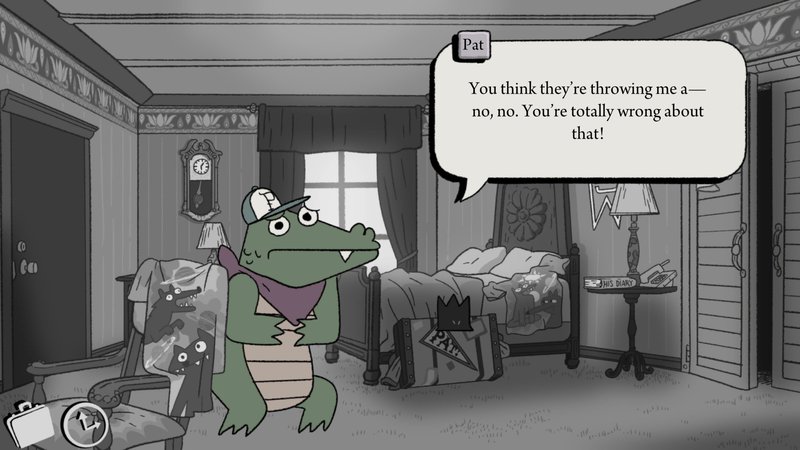
There are some small issues in the gameplay I could nitpick, but I rarely ran into them. I sometimes wished that you could pause during mini-games, or have a quick reference of the instructions in-game in case forgotten. I will say the harder ones do have explanations on hand, and some mini-games don’t need your immediate attention, so a pause button isn’t necessary, but overall I’d appreciate more consistency in being able to pause, adjust the settings, see the instructions again, etc, throughout each mini-game. The Switch version is aiming to come out soon, though, so who knows what changes we may see!
I haven’t even gotten into the music! I could write a review on that alone, but I can at least say the soundtrack by 2 Mello is instantly memorable. The Later Alligator Main Theme is woven throughout the game, morphing from jazz to 8-bit to blues, making it an overall finger-waggin’ good time. The art fits in perfectly, too. Despite Later Alligator’s muted palette, the characters are colorful and alive, with hilarious speaking and idle animations.
In A While, Crocodile
I think it comes as no surprise that I love this game. I had been following the SmallBü animation studio for a while, from their “Baman Piderman” series and their Emmy-award winning work on Cartoon Network. So, when I saw they had teamed up with another favorite developer/publisher Pillowfight to make a hand animated point-and-click game, I had to play.
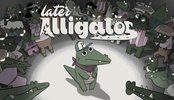 Later Alligator
Later Alligator
Developer: Smallbü
Publisher: Pillowfight
Platforms: PC, Available for preorder for Switch
Price: $17.99 on Steam, $34 for preorder on Switch
Release Date: Sept. 18, 2019
I’m happy to say it didn’t disappoint. It appealed directly to the part of me that would spend hours as a kid playing Humongous Entertainment point-and-click mystery games like Pajama Sam and Freddi Fish on my local library’s computers, obsessively clicking everything to see the funny animations. Later Alligator updates the genre to modern times with the latest in absurdist humor and elevates it by utilizing video games as a medium to its fullest extent.
Later Alligator is one of the only games in recent memory that I want to 100%, it’s so pleasant and engaging. I’ve played it four times, and I’m planning on resetting my data to play again a fifth time. I could recommend Later Alligator for the animation alone, the music alone, the humor...you get the idea. Thankfully, all that goodness is already together, packaged up in a great game with a beautifully polished bow that you should absolutely add to your library ASAP.